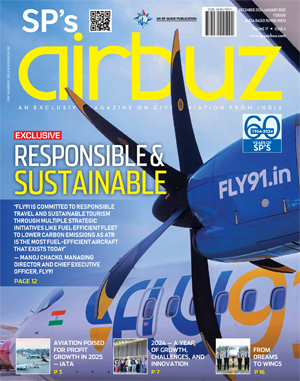Moving Towards Aircraft Manufacturing
India’s ambition to produce its own commercial aircraft is not new, but the government now seeks to go beyond, aiming to not only meet domestic demand but also emerge as a global exporter of commercial aircraft.

In a significant move towards making India selfreliant in the aviation sector, the government has announced plans to establish a Special Purpose Vehicle (SPV) focused on the development and manufacturing of indigenous commercial aircraft. Civil Aviation Minister K. Rammohan Naidu outlined the government’s vision to create a robust aircraft manufacturing ecosystem in India. This long-awaited initiative aims to reduce India’s dependency on foreign manufacturers for its growing aviation needs.
While acknowledging this gap, Minister Naidu stated that the SPV is still in its early stages, with further details to be shared once concrete steps are in place. “India is a major client for large original equipment manufacturers (OEMs) like Airbus and Boeing, so they have a strong inclination to partner with us,” Naidu said, emphasising that the SPV will bring together a wide range of stakeholders, including these OEMs. The goal is to leverage their expertise and knowledge to develop a sustainable aircraft manufacturing ecosystem in India. He also stressed the need for a large-scale manufacturing initiative that could reduce India’s reliance on foreign companies for parts, components, and aircraft. He underscored the potential economic benefits, which align with India’s broader vision of “Atmanirbhar Bharat”.
“Building our own planes is an idea the government is strongly pushing. There have been instances of aircraft manufacturing in India, with HAL being the major player, but we want to scale it up significantly,” Naidu stated. He highlighted that the proposed SPV will focus on addressing critical concerns such as technological know-how, supply chain infrastructure, and market opportunities, with a timeline of five years to lay the groundwork for the aircraft manufacturing plan.
In parallel with these manufacturing efforts, the government is working on the policy front to promote aircraft production. The new ‘Bhartiya Vayuyan Vidheyak’ bill, which is set to replace the nearly century-old Aircraft Act, introduces legal frameworks that support the design and manufacturing of aircraft in India. Naidu mentioned that the bill includes provisions that will give legal backing to aircraft design, a critical step towards enabling local manufacturing.
The government has also been advocating for global OEMs like Airbus and Boeing to set up final assembly lines (FAL) for passenger aircraft in India. While Airbus is collaborating with the Tata Group to establish both a military and a civilian helicopter FAL in the country, there has been no commitment from either Airbus or Boeing to set up a commercial aircraft FAL in India. The absence of such facilities has long been a hurdle in India’s aviation ambitions, but the government’s new initiative could change this dynamic.
India’s potential to become a global player in aircraft manufacturing is immense. With over 1,500 aircraft on order, the country represents a massive market. The challenge now is to transform this demand into a self-sustaining manufacturing ecosystem that reduces reliance on international suppliers.
For India to achieve this goal, it will need not only the involvement of global OEMs but also the development of local talent, infrastructure, and supply chains. Setting up an indigenous aircraft manufacturing industry will require collaboration between various stakeholders, including private companies, public-sector entities like HAL, and global aviation experts. Naidu emphasised that while the road ahead is challenging, the government’s commitment to this vision is unwavering. “India’s aviation market is poised for exponential growth, and we need to ensure that we are not just consumers but also producers of aircraft. We want to inform the industry that the government is taking definitive steps towards this,” Naidu said. He further added that India’s goal is to not only meet the domestic demand for aircraft but also position itself as a competitive exporter in the global aviation market.
The initiative to manufacture aircraft in India represents a crucial and a bold step towards self-reliance in the aviation sector. By establishing an SPV and working closely with global OEMs, the government is finally laying the foundation for a future where India can build and export its own commercial jets. The move aligns with the broader national vision of “Atmanirbhar Bharat,” creating opportunities for economic growth, job creation, and technological advancement. India’s aviation sector is at a pivotal moment, and the decisions made today will shape the industry’s future. While the journey towards indigenous aircraft manufacturing will undoubtedly be complex, it is an essential one for India’s long-term growth and self-sufficiency in the global aerospace landscape.





